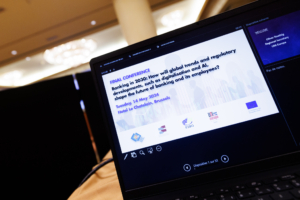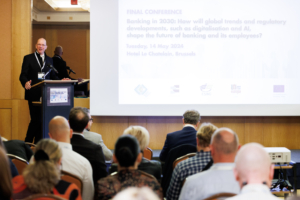Banking sector integral to EU’s competitiveness plan
9 September, Brussels, 2024: The European Banking Federation (EBF) strongly supports the call to boost Europe’s competitiveness outlined in the report by Mario Draghi, Special Advisor to President Ursula von der Leyen, titled “EU competitiveness: Looking ahead” presented today. The report puts forward strategic recommendations on how to make EU’s economy more competitive. A healthy and resilient European banking sector is crucial in order to achieve a globally competitive EU.
Strengthening Europe’s competitiveness is shaping up to be the defining issue for the new EU legislative cycle. Doing so is urgently needed as Europe faces major challenges, including demographics changes, ushering in the digital and sustainable transformations and bolstering defense. A robust, competitive European banking sector will play a vital role in building a more competitive, thriving Europe for its citizens.
To achieve this, we need a regulatory mindset shift, moving from complexity, fragmentation and risk aversion, to fueling economic development and increasing productivity. One promising approach the EBF strongly supports is Mr. Draghi’s proposal to revive the securitisation market by adjusting the current regulatory framework, as well as further exploring the opportunity and feasibility of a securitisation platform.
The European Banking Federation is looking forward to working together with the new European Commission towards the shared goal of increasing Europe’s competitiveness.
Wim Mijs, CEO of EBF said: “The future of Europe’s competitiveness hinges on a healthy banking sector. Europe needs a more liquid and deeper integrated Capital Markets Union, but also a regulatory shift to foster economic growth and massive investment. To support a strong economy, we need an internationally competitive banking system within the EU, as well as an assessment of the banking regulatory framework. I commend the strong supporting signals of European political leaders and thought leaders like Mario Draghi.”
x

Media inquiries:
Gabriel Daia
Head of Communications and Public Affairs, g.daia@ebf.eu, +32 483 50 98 86
x
About the EBF
The European Banking Federation is the voice of the European banking sector, bringing together national banking associations from 45 countries. The EBF is committed to a thriving European economy that is underpinned by a stable, secure and inclusive financial ecosystem, and to a flourishing society where financing is available to fund the dreams of citizens, businesses and innovators everywhere. Website: www.ebf.eu Twitter: @EBFeu.
The post Banking sector integral to EU’s competitiveness plan appeared first on EBF.
]]>European Social Partners for the Banking Sector Sign New Joint Declaration on Employment Aspects of Artificial Intelligence
European Social Partners for the Banking Sector Sign New Joint Declaration on Employment Aspects of Artificial Intelligence
BRUSSELS, 14 May 2024 – 90 social partners from the European and national sectoral level gathered today to witness the European Social Partners for the banking sector sign a Joint Declaration on Employment Aspects of Artificial Intelligence. This declaration is the beginning of an ongoing process on AI, and also the culmination of extensive collaboration and dialogue among the stakeholders, taking into account the sector’s dynamic challenges and opportunities in introducing processes and systems which use AI.
“Introducing AI in the workplace comes with both risks and opportunities to bank employees. Social dialogue at all levels is vital to ensure that AI systems are implemented responsibly. We acknowledge the commitment made today by the European Bank Social Partners towards social dialogue, including collective bargaining, at all levels.” – Michael Budolfsen, UNI Europa Finance President.
This declaration builds upon the rich history of joint declarations signed by the European Social Partners over the past five years, such as the Joint Declaration on Telework in the European Banking Sector (2017), the Joint Declaration on the Impact of Digitalisation on Employment (2018), and the Joint Declaration on Remote Work and New Technologies (2021).
Moreover, it draws insights from the two-year European Commission-funded social partner project, ‘Banking in 2030: How will the current global trends and especially Artificial Intelligence (AI) shape the future of the European banking industry and its employees?’
The signing took place around the final conference of the ‘Banking in 2030’ project, which saw desk research and sector interviews from across the EU carried out by Arix Business Intelligence GmbH and three European workshops in Paris, Stockholm and Zagreb with local social partners in attendance.
“This Joint Declaration marks an important moment in our ongoing dialogue and collaboration with our trade union counterparts in the banking sector. By addressing the employment aspects of Artificial Intelligence, we are laying the groundwork for a future that prioritises both innovation and our workforce.” – Jens Thau, Chairman of the EBF’s Banking Committee on European Social Affairs.
The rise of AI presents both challenges and opportunities, as highlighted by the findings of the ‘Banking in 2030’ project. Accelerated digitalisation, compounded by the COVID-19 pandemic, has propelled the adoption of AI in the banking sector, reshaping customer interactions and operational paradigms for its employees. Recognising the transformative potential of AI, the European Social Partners underscore the importance of a proactive joint engagement and responsible use of this technology.
“The finance sector has taken the lead on ensuring workers can influence AI in the workplace. These commitments will be a useful tool for UNI Europa Finance and our affiliated unions to negotiate collective agreements on AI in the workplace.” – Maureen Hick, UNI Europa Finance Director.
Key highlights of the Joint Declaration include:
Definition of Artificial Intelligence: Providing a comprehensive understanding, in line with the EU definition in the AI Act, of AI and its principal features, emphasising the importance of transparency and human oversight in its deployment.
Social Dialogue: Social dialogue at all levels, including collective bargaining, represents an effective and positive tool for addressing the impact of new technologies and digitalisation in the workplace. The European Social Partners undertake to continue the monitoring and analysis of the related effects, also regarding the diversified evolution of work organisational models.
Current Status and Responsible Use: Acknowledging the increasing prevalence of AI in the banking sector and advocating for a responsible, transparent, and unbiased approach to its deployment, particularly in human resources-related functions.
Health and Safety: Regarding the use of AI systems, the European Social Partners recommend regularly performing joint Occupational Safety and Health (OSH) risk assessments that include the effects of algorithmic management.
Training and Digital Competence Development: Highlighting the necessity of continuous upskilling and reskilling to adapt to the evolving digital landscape and bridge the digital divide to have a workforce fit for the future. The European Social Partners strongly encourage the European Commission and national governments to fund such trainings. “The human-in-control is a vital function in AI processes and systems, and this function will benefit from upskilling and reskilling as the technology develops. We started this project before programmes such as ChatGPT were created and already they are widespread.” – Michael Kammas, Vice-Chairman of EBF BCESA and Director General of the Association of Cyprus Banks.
Digital Rights: The European Social Partners consider that the increasing use of AI makes it necessary to maintain a series of individual and collective digital rights in accordance with applicable law and collective bargaining agreements.
Monitoring and Evaluation: Committing to ongoing monitoring and evaluation of the Joint Declaration’s implementation at the national, sectoral and company level, with a focus on social dialogue, collective bargaining and sharing best practices.
“As we navigate the complexities of AI integration in the banking sector, it is imperative that we prioritise fairness, transparency, and human-centred approaches. This Joint Declaration underscores our collective commitment to advancing technological innovation while continuing the social dialogue on workers’ rights.” – Sébastien de Brouwer, Deputy CEO, European Banking Federation.
“This Joint Declaration is the first to establish mutually-agreed standards on AI that set clear boundaries and protections for workers across the European banking sector. The statement is a good start and now we need to make a joint effort to ensure it is implemented widely.” – Elke Maes UNI Europa Finance Vice President
The European Social Partners will undertake a full evaluation of this Joint Declaration towards the end of their 2025-2026 Work Programme.
The European Social partners would like to thank their national representatives in Paris, Stockholm, and Zagreb for on-the-ground support for the three European workshops and consultancy Arix Business Intelligence GmbH for their continuous support in developing a report on their findings.
In closing, the European Social Partners reaffirm their commitment to fostering a collaborative and inclusive approach towards harnessing the potential of AI while safeguarding the interests of all stakeholders in the European banking sector.
For media inquiries and further information, please contact:
Michelle Schonenberger – m.schonenberger@ebf.eu – European Banking Federation
Léonie Guguen – leonie.guguen@uniglobalunion.org – UNI Global Union
x
About the EBF
The European Banking Federation is the voice of the European banking sector, bringing together national banking associations from 45 countries. The EBF is committed to a thriving European economy that is underpinned by a stable, secure and inclusive financial ecosystem, and to a flourishing society where financing is available to fund the dreams of citizens, businesses and innovators everywhere. Website: www.ebf.eu Twitter: @EBFeu.
The post European Social Partners for the Banking Sector Sign New Joint Declaration on Employment Aspects of Artificial Intelligence appeared first on EBF.
]]>Financing Europe’s Competitiveness: European Banking Federation recommendations for Europe’s incoming powerhouse
Financing Europe’s Competitiveness: European Banking Federation recommendations for Europe’s incoming powerhouse
BRUSSELS, 17 April 2024 – The European Banking Federation (EBF), representing more than 3500 banks, unveiled today the recommendations for the incoming European leaders. Titled “Financing the future: a strategic banking sector for a competitive Europe”, the document underlines the readiness of the sector to power Europe’s ambitions by formulating a set of policy recommendations aimed at improving the regulatory framework for the next 5 years and beyond.
The Memorandum serves as a waking moment for European policymakers embarking on their mandate. The EBF highlights the focus of next five years’ key priorities, including bolstering the EU’s economic potential, promoting transition finance for the EU Green Deal, fostering a secure digital transformation, and completing the Single Market for financial services. Furthermore, it underscores the urgent need for an integrated, open, and liquid capital market in Europe capable of mobilizing private capital at the scale required for unlocking Europe’s economic transformation.
The 2024 European elections represent an opportunity to rethink the approach towards strategic sectors to restore Europe’s global competitiveness. As our continent has been facing pivotal challenges – from the COVID-19 pandemic to geopolitical tensions – the European banking sector has displayed remarkable resilience. Nevertheless, these events have exposed vulnerabilities within global value chains, exacerbating Europe’s fading global competitiveness.
At the forefront of these changes, Europe’s banks emerge as essential catalysts for progress. The banking sector is ready to take its responsabilities in funding the substantial investments needed for Europe – however this can only be achieved through a regulatory and supervisory framework that fosters competitiveness and profitability in a rapidly evolving global world ensuring fair competition among all financial entities across Europe and beyond.
Furthermore, Europe must urgently advance the development of European capital markets. It is imperative to mobilize a substantial amount of private investment through capital markets to finance the challenges ahead. Moreover, Europe needs to prioritise measures that can swiftly increase financing capacity, such as revitalizing the securitization market.
Policymakers must acknowledge the vital role of the European banking sector in driving both growth and strategic autonomy for a sustainable future in Europe. The EBF remains committed in fostering constructive dialogue with the incoming EU leaders, citizens and stakeholder representatives. This is a moment not for complacency, but for bold ambition. Now is the time for Europe to seize control of its destiny, reclaiming its position as a powerhouse on the world stage.
x
Media inquiries:
Sébastien de Brouwer
Deputy CEO, s.debrouwer@ebf.eu
Gabriel Daia
Head of Communications and Public Affairs, g.daia@ebf.eu
x
About the EBF
The European Banking Federation is the voice of the European banking sector, bringing together national banking associations from 45 countries. The EBF is committed to a thriving European economy that is underpinned by a stable, secure and inclusive financial ecosystem, and to a flourishing society where financing is available to fund the dreams of citizens, businesses and innovators everywhere. Website: www.ebf.eu Twitter: @EBFeu.
The post Financing Europe’s Competitiveness: European Banking Federation recommendations for Europe’s incoming powerhouse appeared first on EBF.
]]>Leading European Associations’ Shared View On Improving Competitiveness of European Capital Markets
Leading European Associations’ Shared View On Improving Competitiveness of European Capital Markets
LONDON, BRUSSELS, 7 May 2024 – The European Banking Federation (EBF), the European Fund and Asset Management Association (EFAMA), and the Federation of European Securities Exchanges (FESE) have released a joint report on the development of European capital markets and recommendations to enhance their competitiveness. The report, co-developed by the three European associations and authored by Oliver Wyman, sheds light on progress made towards the Capital Markets Union (CMU) and gathers insights from various capital markets leaders on how to succeed in the coming decade and beyond.
This is the result of extensive research and interviews conducted with 37 senior industry stakeholders, synthesised into a “collective voice” of the European capital markets on the challenges and opportunities faced in order to strengthen Europe’s competitiveness.
European capital markets are currently facing a decline in competitiveness, particularly when compared to the United States. This poses a significant threat to Europe’s economic growth and its ability to finance innovation, support green and digital transformation, and address the needs of an aging population. The report highlights the importance of leveraging Europe’s capital markets infrastructure to its full potential, increasing overall capital pools, and enhancing investor outcomes. It emphasises the need to activate the demand side of capital markets by improving retail investors’ access to attractive products, enhancing financial literacy, incentivising retirement savings, and creating tax structures conducive to long-term investments.
The findings of this report provide a roadmap for policymakers, regulators, and industry stakeholders, showing how capital markets benefit from scale and a “flywheel effect”. Deliberate demand-side and supply-side steps taken over the next 5-years can set the conditions that will build more momentum, attract more investors, and create more investment opportunities for the decades ahead.
Magnus Burkl, Partner at Oliver Wyman, highlighted that “Our research for this report reinforces our belief that European Capital Markets are well-functioning but performing below their full potential. To reach its full potential, Europe needs to activate long-term capital pools across retail and institutional investors, which can act as a flywheel for increasing the competitiveness of capital markets.”
FESE Director General Rainer Riess said “Europe needs deep and liquid capital markets to finance its companies and deliver attractive valuations. Cutting red tape and getting citizens to put their investments into capital markets are key to unlock the flywheel.”
Tanguy van de Werve, Director General at EFAMA, commented that “Increasing pension savings of European citizens is key to help fill the retirement gap and can boost Europe’s capital markets. Bold actions from policymakers are now required to defuse the pension time bomb and allow our companies to thrive.”
Wim Mijs, European Banking Federation CEO, said ‘’Developing vibrant and competitive European capital markets is crucial to harness the necessary financing power to usher in true economic transformation in the EU. This report marks a significant milestone in outlining the path towards game-changing reforms that can fulfill the full potential of European capital markets. With Brussels and EU member states attentively listening, the momentum for change is palpable.’’
x
For more information about the report and its findings, please contact:
Marián Caro for FESE (caro@fese.eu)
Hayley McEwen for EFAMA (hayley.mcewen@efama.org)
Gabriel Daia for EBF (g.daia@ebf.eu)
x
About Oliver Wyman
Oliver Wyman is a global leader in management consulting. With offices in more than 70 cities across 30 countries, Oliver Wyman combines deep industry knowledge with specialized expertise in strategy, operations, risk management, and organization transformation. The firm has 7,000 professionals around the world who work with clients to optimize their business, improve their operations and risk profile, and accelerate their organizational performance to seize the most attractive opportunities. Oliver Wyman is a business of Marsh McLennan [NYSE: MMC]. For more information, visit www.oliverwyman.com. Follow Oliver Wyman on LinkedIn and X.
About FESE
The Federation of European Securities Exchanges (FESE) represents 35 exchanges in equities, bonds, derivatives and commodities through 16 Full Members and 1 Affiliate Member from 30 countries. At the end of 2023, FESE members had 6,726 companies listed on their markets, of which 18% are foreign companies contributing towards European integration and providing broad and liquid access to Europe’s capital markets. Many of our members also organise specialised markets that allow small and medium-sized companies across Europe to access capital markets; 1,461 companies were listed in these specialised markets/segments in equity, increasing choice for investors and issuers. Through their regulated market and multilateral trading facility operations, FESE members are keen to support the European Commission’s objective of creating a competitive and efficient Capital Markets Union. For more information, visit www.fese.eu. Follow FESE on LinkedIn.
About the EBF
The European Banking Federation is the voice of the European banking sector, bringing together national banking associations from 45 countries. The EBF is committed to a thriving European economy that is underpinned by a stable, secure and inclusive financial ecosystem, and to a flourishing society where financing is available to fund the dreams of citizens, businesses and innovators everywhere. Website: www.ebf.eu Twitter: @EBFeu.
About EFAMA
EFAMA is the voice of the European investment management industry, which manages around EUR 28.6 trillion of assets on behalf of its clients in Europe and around the world. We advocate for a regulatory environment that supports our industry’s crucial role in steering capital towards investments for a sustainable future and providing long-term value for investors. Besides fostering a Capital Markets Union, consumer empowerment and sustainable finance in Europe, we also support open and well-functioning global capital markets and engage with international standard setters and relevant third-country authorities. EFAMA is a primary source of industry statistical data and issues regular publications, including Market Insights and the authoritative EFAMA Fact Book. More information is available at www.efama.org
The post Leading European Associations’ Shared View On Improving Competitiveness of European Capital Markets appeared first on EBF.
]]>The European Banking Federation supports the vision of Enrico Letta on the Future of the Single Market
The European Banking Federation supports the vision of Enrico Letta on the Future of the Single Market
BRUSSELS, 18 April 2024 – The EBF very much welcomes the publication of Enrico Letta’s report on the Future of the Single Market published today. The cooperation dates back to 2019 in the context of the Markets4Europe campaign of which Mr. Letta agreed to be a leader.
We are grateful to Mr. Letta for having included the European Banking Federation amongst the stakeholders consulted to elaborate the Report. We took the opportunity to provide our views on how to strengthen the EU single market with respect to the integration and development of Europe’s capital markets to serve the needs of Europe’s innovative companies, its citizens and the prosperity of its economy in general.
More precisely, the European Banking Federation strongly supports Mr. Letta’s remarks on the following:
- The importance of Capital Markets in mobilizing private capital, a crucial step that lays the groundwork for a more inclusive and efficient financing framework. Europe needs more capital markets financing than ever before. From the aging population to the need to finance entrepreneurship and sustainability, key mechanisms for savings and investments needed by citizens require a well-functioning, deep, resilient capital market that reaches every corner of Europe while restoring its global competitiveness.
- The call for reforms in the European securitization framework to enhance is accessibility and effectiveness. The report acknowledged that securitisation acts as a unique link between credit and capital market and offers significant potentials in diversifying the pool of assets available for investment and facilitate additional financing. The EBF believes it should be a priority for the next term.
- The need to catch up and strengthen the Single Market dimension for financial services, making the market evolve towards a European dimension. The attempt to create the Capital Markets Union over the past decade has not been successful, among other causes, because it has been perceived as an end in itself. The job of creating a Capital Markets Union is not yet complete in terms of establishing efficient and competitive market infrastructures, efficient and enabling rules and regulations, as well as sufficient supply and demand for capital markets.
- The paths that still need to be undertaken to achieve the goal. The Single Market is an ongoing project and should not be perceived as a completed endeavour. To develop an efficient single market capable of creating the conditions to make Europe prosper, action is required at each level. Specific and targeted actions are needed at both EU level, to further integrate the market, and at Member States level to further deepen it. Indeed, EU regulatory actions must be complemented by national government actions that boost the supply and demand for capital markets. A “capital markets mindset” is required at Member States level, as well as citizens level, to make them aware of the benefits of a well-functioning capital market and what actions they can undertake.
x
Media inquiries:
Gabriel Daia
Head of Communications and Public Affairs, g.daia@ebf.eu, +32 483 50 98 86
x
About the EBF
The European Banking Federation is the voice of the European banking sector, bringing together national banking associations from 45 countries. The EBF is committed to a thriving European economy that is underpinned by a stable, secure and inclusive financial ecosystem, and to a flourishing society where financing is available to fund the dreams of citizens, businesses and innovators everywhere. Website: www.ebf.eu Twitter: @EBFeu.
The post The European Banking Federation supports the vision of Enrico Letta on the Future of the Single Market appeared first on EBF.
]]>ESAP, or the value of giving European solutions to European problems
EBF SUSTAINABLE FINANCE ROUNDUP ARTICLE
ESAP, or the value of giving European solutions to European problems
By Jacopo Borgognone, EBF Policy Adviser
z
BRUSSELS, 20 June 2022
x
In the context of the 2020 Capital Markets Union Action Plan, the European Commission put forward the proposal to establish a European Single Access Point (ESAP) for financial and sustainability-related information reported under EU law. Arguably, this is not just about innovation, but about providing a European solution to an exquisitely European problem: fragmentation along invisible borders. As statistics from the European Commission and IMF also show, European companies and financial entities under EU law report a great deal of information. However, information travels very hardly across borders, and even more hardly to the end user. This in turn reinforces the home-bias of European investors, reducing the share of market-based financing in the EU and thus the specific weight of European capital markets as a whole. A successful ESAP can reverse the trend but -the paper explains- it is key that ESAP does not fall victim to its own ambition. To do so, it is necessary that it ‘starts small, but thinks big’. Here is how.
For more information:
Jacopo Borgognone, Financial Markets – Financing Sustainable Growth j.borgognone@ebf.eu
The post ESAP, or the value of giving European solutions to European problems appeared first on EBF.
]]>Brexit: EBF view on the use of equivalence regimes
EBF advisors: Pauline Guérin, Sergio Tringali, Jacopo Borgognone
Publication date: 29 May 2020
The ongoing Brexit negotiations on the future relationship will have a major impact on customers, businesses and citizens on both sides of the Channel. Irrespective of the outcome, the impact will not mean business as usual as the current situation where the UK is still part of the Single Market. Equivalence in the financial sector will most probably be a major tool for regulating interactions with third countries but will not replicate the benefits of Single Market membership. Against this background, the European banking sector calls on both sides to enable the development of the closest possible third-country relationship with the UK, to ensure a level playing field and fair competition, to provide legal clarity, and to build the trust that is needed to maintain a mutually beneficial bilateral relationship.
The purpose of the current paper is to outline the banking sector’s expectations for the future relationship in financial services, as well as providing views on how an equivalence regime could accommodate a mutually beneficial bilateral relationship between the EU and the UK, by preserving financial stability, market integrity, investor and consumer protection and fair competition based on a level playing field. While it is covered to a lesser extent in the paper, the UK’s assessment of the EU’s framework is as important as the EU regime. The following analysis presupposes a deal, the absence of which would raise a separate set of significant risks, which we analysed in 2019. In this context, with the chance of a no-deal scenario still very high, we urge both parties to agree to an extension of the transitional arrangement before the end-June 2020 deadline to give all parties more time to reach a satisfactory agreement, especially considering the exceptional circumstances arising from the ongoing health crisis. In any case, the European Banking Federation calls on all its members and on banks to finalize preparations for the end of the transition period and to envisage all the scenarios possible
Find the EBF document by clicking the button below:
Have a look at the EBF Brexit web page. It brings together information to help bank customers prepare for Brexit
Latest posts
- EU T+1 Industry Committee launches roadmap and opens consultation period for capital markets transformation
- European Credit Sector Associations welcome efforts to strengthen European retail payments
- The EU T+1 Industry Committee finalises High-Level Road Map
- Vacancy: Innovation and Cybersecurity Trainee
- New study stresses urgent need for regulatory capital efficiency
Subscribe to the EBF Weekly + FinReg Agenda
Every Friday at noon you can receive the EBF Weekly + Financial Regulation Agenda. This agenda presents an overview of upcoming European and international meetings and conferences in financial regulation, as well as important general financial and economic events and key EBF meetings for the week ahead. CLICK HERE TO SUBSCRIBE
Subscribe to the EBF Morning Brief
The EBF Morning Brief is published Monday through Friday morning and brings you the top banking headlines, relevant announcements from the EU institutions and the latest from the EBF and its members, national banking associations in 32 countries in Europe. CLICK HERE TO SUBSCRIBE
The post Brexit: EBF view on the use of equivalence regimes appeared first on EBF.
]]>Brexit: Statement on UK departure from the EU
EBF STATEMENT
Brexit: Statement on UK departure from the EU
BRUSSELS, 30 January 2020 – The European Banking Federation issued the following statement on the upcoming departure of the United Kingdom from the European Union.
The departure has been made possible by last week’s approval of the Withdrawal Agreement by both the Houses of Parliament in the UK and yesterday’s vote of the European Parliament in plenary session. This paves the way for an orderly Brexit on Friday 31 January 2020, as advocated by the EBF since the beginning of the withdrawal process.
Says Wim Mijs, Chief Executive Officer of the European Banking Federation:
“We are sure that shared values will continue to unite the two sides of the Channel and will drive the negotiations on the future trade agreement. Although a separation in the EU membership will affect trade and the economy, we are confident that our sector will continue to meet the needs of customers in providing banking services – payments – and access to financial markets.
Now that the transition period is about to start, it will be fundamental to define the future trade relationship between the EU and the UK. The EBF stands ready to contribute to the trade talks and will continue engaging with EU institutions and ESAs.
Banks on both sides of the Channel want to be able to continue to serve businesses and households with as little friction as possible. This, as well as maintaining financial stability and ensuring consumer protection, should be a key objective for financial services in the upcoming trade talks.”
On its website, the EBF has brought together a wide range of Brexit service pages from its members as well as EU bodies: https://www.ebf.eu/brexit/
Media contact:
Raymond Frenken, Director of Communications, +32 496 52 59 47, r.frenken@ebf.eu
EBF Mediacentre: +32 2 508 3732
About the EBF:
The European Banking Federation is the voice of the European banking sector, bringing together national banking associations from across Europe. The EBF is committed to a thriving European economy that is underpinned by a stable, secure and inclusive financial ecosystem, and to a flourishing society where financing is available to fund the dreams of citizens, businesses and innovators everywhere. Website: www.ebf.eu
Latest posts
- EU T+1 Industry Committee launches roadmap and opens consultation period for capital markets transformation
- European Credit Sector Associations welcome efforts to strengthen European retail payments
- The EU T+1 Industry Committee finalises High-Level Road Map
- Vacancy: Innovation and Cybersecurity Trainee
- New study stresses urgent need for regulatory capital efficiency
Subscribe to the EBF Weekly + FinReg Agenda
Every Friday at noon you can receive the EBF Weekly + Financial Regulation Agenda. This agenda presents an overview of upcoming European and international meetings and conferences in financial regulation, as well as important general financial and economic events and key EBF meetings for the week ahead. CLICK HERE TO SUBSCRIBE
Subscribe to the EBF Morning Brief
The EBF Morning Brief is published Monday through Friday morning and brings you the top banking headlines, relevant announcements from the EU institutions and the latest from the EBF and its members, national banking associations in 32 countries in Europe. CLICK HERE TO SUBSCRIBE
The post Brexit: EBF Statement on UK departure from the EU appeared first on EBF.
]]>Brexit: financial firms are better prepared
EBF STATEMENT
Brexit: financial services are better prepared
BRUSSELS, 5 November 2019 – European financial service firms are more prepared than before to handle a possible no-deal Brexit scenario. According to an internal consultation among members of the European Banking Federation, many financial service firms have continued to step up their contingency planning in recent months.
The European Banking Federation, which brings together national banking associations from 32 European countries, continues to advocate in favour of a managed Brexit that is based on an official Withdrawal Agreement between the EU and the UK. This would enable a short transition period that would give financial service firms, and other stakeholders in the economy, more time to prepare for a future agreement which still needs to be negotiated.
Although a separation in the membership of the European Union may have an impact on trade and the economy, the EBF remains confident that the banking sector will continue to support European economies and serve its customers in the event of a no-deal.
Says Wim Mijs, Chief Executive Officer of the EBF:
“Thanks to the ‘flextension’ until the end of January there is more time to facilitate the UK leaving the EU with an agreement. The clock has been reset but continues to tick fast. We hope that the UK will find a way forward soon. Meanwhile our banks and other financial service firms across Europe are even more prepared and continue to implement their Brexit contingency plans.”
If they have not already done so, businesses and retail customers whose finances involve the UK and the EU are advised to contact their bank to make sure that they won’t face problems that can be prevented. On its website, the EBF has brought together a wide range of Brexit service pages from its members as well as EU bodies: https://www.ebf.eu/brexit/
Latest posts
- EU T+1 Industry Committee launches roadmap and opens consultation period for capital markets transformation
- European Credit Sector Associations welcome efforts to strengthen European retail payments
- The EU T+1 Industry Committee finalises High-Level Road Map
- Vacancy: Innovation and Cybersecurity Trainee
- New study stresses urgent need for regulatory capital efficiency
Subscribe to the EBF Weekly + FinReg Agenda
Every Friday at noon you can receive the EBF Weekly + Financial Regulation Agenda. This agenda presents an overview of upcoming European and international meetings and conferences in financial regulation, as well as important general financial and economic events and key EBF meetings for the week ahead. CLICK HERE TO SUBSCRIBE
Subscribe to the EBF Morning Brief
The EBF Morning Brief is published Monday through Friday morning and brings you the top banking headlines, relevant announcements from the EU institutions and the latest from the EBF and its members, national banking associations in 32 countries in Europe. CLICK HERE TO SUBSCRIBE
The post Brexit: financial firms are better prepared appeared first on EBF.
]]>Brexit: WTO implications for banks in case of a no-deal scenario
EBF publishes fact sheet explaining what banks can expect
EBF FACT SHEET ON BREXIT
Brexit: WTO implications for banks in case of no-deal
BRUSSELS, 28 October 2019 – The European Banking Federation has published a new fact sheet that explains which global trade rules will apply to European banks in the event of a no-deal Brexit. In the case of such a scenario, all trade between the EU and UK will be governed by the international rules agreed at the level of the World Trade Organisation, known as WTO. The fact sheet specifically addresses the WTO implications for banks.
Although the risks of the UK leaving the EU without an agreement in place to regulate its trade relations with the EU are not as high as they used to be, the paper addresses which rules will be applicable to regulate the future relationship between EU banks and the UK. In such hypothesis, the WTO rules will certainly apply from day one.
In particular, the following consequences are expected to occur:
- First of all, the General Agreement on Trade in Services (“GATS”), considered the WTO basic agreement on trade, including also the banking sector, will come into force.
- While the GATS does not replicate EU membership, it will still play an important role in case of a no-deal Brexit. GATS rules will be helpful to handle the absence of agreements:
1) The GATS will provide a baseline of protection: in principle, it will not allow the EU (or the UK) to discriminate against EU/UK banking services and service suppliers as compared to like services and services suppliers from other WTO members.
2) The GATS establishes key rules on recognition of prudential requirements: The WTO does not require its members to recognise the prudential requirements of other members. However, where it does, it must offer adequate opportunity to other WTO members for similar treatment.
3) It is important to distinguish between Member States opting for Mode 1 (supply of service from the territory of one Member into the territory of any other Member) and those opting for Mode 2 (supply of a service in the territory of one member to the service consumer of any other member state).
WTO banking commitments for (at least) the EU-12 Member States subscribing to the Understanding (BE, DE, DK, ES, FR, GR, IE, IT, LU, NL, PT, UK) are wide in relation to Mode 2, but not for Mode 1. The lack of market access commitments for Mode 1 has led to the prevailing view that the WTO cannot provide any basis for a right in principle to be able to provide banking services from the UK into the EU (or vice-versa).
The fact sheet was produced in cooperation with Herbert Smith Freehills LLP and with support of the Dutch banking association NVB .
Latest posts
- EU T+1 Industry Committee launches roadmap and opens consultation period for capital markets transformation
- European Credit Sector Associations welcome efforts to strengthen European retail payments
- The EU T+1 Industry Committee finalises High-Level Road Map
- Vacancy: Innovation and Cybersecurity Trainee
- New study stresses urgent need for regulatory capital efficiency
Subscribe to the EBF Weekly + FinReg Agenda
Every Friday at noon you can receive the EBF Weekly + Financial Regulation Agenda. This agenda presents an overview of upcoming European and international meetings and conferences in financial regulation, as well as important general financial and economic events and key EBF meetings for the week ahead. CLICK HERE TO SUBSCRIBE
Subscribe to the EBF Morning Brief
The EBF Morning Brief is published Monday through Friday morning and brings you the top banking headlines, relevant announcements from the EU institutions and the latest from the EBF and its members, national banking associations in 32 countries in Europe. CLICK HERE TO SUBSCRIBE
The post Brexit: WTO implications for banks in case of a no-deal scenario appeared first on EBF.
]]>
























